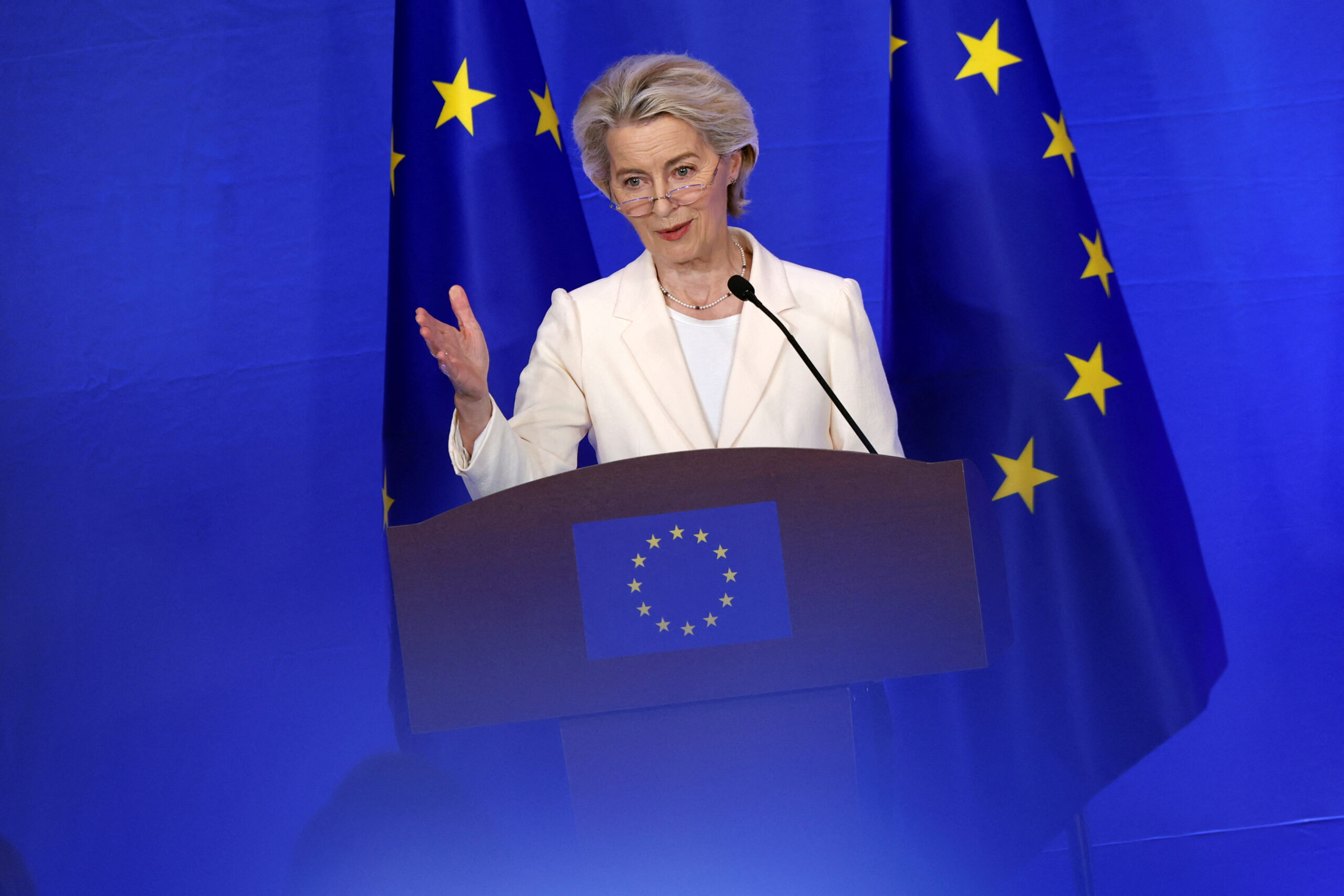August 15, 2025
Talking past each other: Why the US-EU dispute over ‘free speech’ is set to escalate
As the mercury climbs in Washington, DC, this summer, so is the heat generated by Europe’s laws on moderating online content. US social media platforms that operate in Europe and are subject to European Union (EU) laws are sweating. All signs indicate that the Trump administration and its congressional supporters are just getting started in critiquing the EU’s Digital Services Act (DSA), a sprawling and complex framework regulating illegal content, hate speech, and disinformation on online platforms.
On July 25, the Republican majority on the House of Representatives Committee on the Judiciary released a staff report entitled “The Foreign Censorship Threat: How the European Union’s Digital Services Act Compels Global Censorship and Infringes on American Free Speech.” The Republican-led report argues that the DSA, “camouflaged as a regulation to increase online safety,” is in fact “a powerful censorship law that gives European regulators the ability to suppress speech globally with which they disagree.” The EU’s flagship effort to regulate online content, the report asserts, is no less than an “anti-speech, Big Brother law.” In response, the EU maintains that its rules uphold citizens’ free speech rights and are aimed at ridding these platforms of illegal content involving matters such as terrorist activity and child abuse.
The congressional committee’s rhetoric is based on a thirty-eight-page analysis and seventy pages of appendices assessing the complex regulatory construct of the DSA. The staff report emphasizes that the DSA’s framework for platforms to assess systemic risk (Article 34) goes beyond illegal content to encompass legal content that has “negative effects on civic discourse and electoral processes and public security,” among other impacts. The DSA’s preamble instructs platforms to “pay particular attention” to misleading or deceptive content, including disinformation.
Major social media platforms generally have one set of terms and conditions that apply worldwide, the staff report points out. Since penalties under the DSA can amount to 6 percent of a company’s global revenue, platforms have a strong incentive to tailor their global content moderation policies to meet the European standard. This level of potential penalty is also found in the bloc’s privacy rules, known as the General Data Protection Regulation. Many companies therefore “apply EU-mandated standards to content posted by American citizens.” Therefore, the report continues,
- The threat to American speech is clear: European regulators define political speech, humor, and other First Amendment-protected content as ‘disinformation’ and ‘hate speech,’ and then require platforms to change their global content moderation policies to censor it.
The report includes a series of examples showing the alleged extraterritorial reach of the DSA associated with content that was accessible within the EU:
- An August 2024 letter from then-European Commissioner for Internal Market Thierry Breton to Elon Musk, whose X platform had hosted a live campaign interview with then presidential candidate Donald Trump, warning that “spillovers” of US speech into the EU could spur “interim” Commission retaliatory “measures” against X under the DSA;
- A 2024 request to TikTok from a Polish official entity, the National Research Institute, that it remove a post asserting that “electric cars are neither ecological nor an economical solution”;
- A request to X from the French National Police that it remove a post from a US-based account that suggested France’s immigration and citizenship policies were to blame for a 2023 terrorist attack in Annecy committed by a Syrian refugee;
- A 2024 decision by German authorities that a tweet calling for the deportation of a Syrian family constituted incitement to hatred and violence; and
- A scenario used during a workshop organized by the European Commission suggesting that an image of a teenage Muslim girl in a hijab, accompanied by a tweet urging “we need to take back our country,” be considered hate speech.
The Judiciary Committee authors concede that none of these incidents had a concrete impact on free speech in the United States. Breton’s letter was regarded as such a political misstep that he resigned from the Commission soon after sending it, under pressure regarding this episode from Commission President Ursula von der Leyen. TikTok and X refused to remove the content flagged by the Polish and French authorities outside the territories of those two countries. The Commission scenario, floated in a DSA workshop, was hypothetical. Only the German tweet is no longer accessible, although, the report concedes, “the reason why is unclear.”
Since issuing its report, the House Judiciary Committee has taken its critique of European laws regulating online speech on the road—to Dublin, London, and Brussels. In London, Chairman Jim Jordan and a bipartisan delegation held meetings in late July with the United Kingdom’s Office of Communications, which is responsible for enforcing that country’s far-ranging 2023 Online Safety Act (OSA), and the country’s digital minister. In Brussels, it met with Henna Virkkunen, the European commissioner for tech sovereignty, security, and democracy, regarding the DSA. The Republican members of the US delegation expressed concern that OSA and DSA provisions with extraterritorial reach, aimed at protecting users from harmful online content, could have an impact on Americans’ speech rights.
The White House weighs in
The House Judiciary report is aligned with a series of executive branch pronouncements inveighing against alleged foreign threats to free speech in the United States.
In February, soon after Trump took office, he issued a memorandum declaring, “The Administration will review whether any act, policy, or practice in the European Union or United Kingdom incentivizes U.S. companies to develop or use products and technology in ways that undermine free speech or foster censorship.” The same month, US Vice President JD Vance, in a speech to the Munich Security Conference, took aim at Germany’s suppression of political speech by the far-right Alternative for Germany party.
Brendan Carr, the Republican chairman of the Federal Communications Commission, has also criticized the DSA. At a March global telecommunications regulators conference, he described the EU measure as “something that is incompatible with both our free speech tradition in America and the commitments that these technology companies have made to a diversity of opinions.”
In addition, the Trump administration is using diplomatic channels to send a similar message to Europe. In response to a French government endorsement of the DSA, the US Department of State on July 22 posted on X, “In Europe, thousands are being convicted for the crime of criticizing their own governments.” The State Department declined to respond to a Washington Post request for evidence identifying the “thousands.”
On August 4, the State Department instructed embassies in Europe to build opposition to the DSA, which it said was imposing “undue” restrictions on freedom of expression in its efforts to combat hate speech, misinformation, and disinformation. The cable directed US diplomats to advocate for a narrowing of the DSA’s definition of “illegal content,” among other ambitions. The European Commission pushed back, describing the censorship allegations as “completely unfounded,” and insisting its digital legislation “will not be changed.”
Any ‘reasonable’ free speech regime?
The congressional authors insist that the DSA is a danger to free speech worldwide, and not just in the United States. They contend that “content targeted by the EU—core political speech, humor, parody, and satire—is protected under any reasonable free speech legal regime, including the First Amendment to the U.S. Constitution.” (Italics added.)
It is a mistake, however, to regard US constitutional free speech doctrine as the mainstream global norm.
Under long-standing US Supreme Court precedent, only speech creating a “clear and present danger”—shouting “fire” in a crowded theater, for example—is considered impermissible incitement. In a 1977 case, the Supreme Court famously allowed a neo-Nazi group to march through Skokie, Illinois, a Chicago suburb with a sizable number of Jewish Holocaust survivors, despite the provocation, anger, and anxiety that the event was sure to trigger.
In fact, it is the US constitutional view of free speech that is distinctive in the global context. Few democratic countries—particularly in an era of pervasive internet-disseminated hate and illegal content—would unequivocally endorse the US view of speech as a “marketplace of ideas.” Many European judiciaries, informed by their countries’ own twentieth-century histories of hate speech, take a more cautious view. Germany, for instance, implements laws against Holocaust glorification, consistent with its doctrine of “militant democracy.” It is not the only European country to do so; Denmark, for instance, has made it illegal to burn the Quran.
The DSA is the EU’s effort to translate to the online world this cautious European sensibility. Its drafters insist the regulation doesn’t disallow specific content. Instead, it requires platforms to put safeguards in place to remove content when that content is found to be illegal or hateful, and provide transparency on how they implement their internal terms of service. Some platforms use geo-blocking as a way of ensuring that actions removing content for violating a local law like the DSA have effect only in the relevant jurisdiction.
Other countries outside Europe, including Australia, South Korea, and Brazil, are also pursuing legislation resembling the DSA that is aimed at protecting their citizens from illegal content shared on social media platforms.
US critics are right, though, to point out the potential for abuse in the regulation’s broad application to speech that is legal. The examples identified in the House report are concerning, though the report’s authors fail to demonstrate any impact on US speech.
Transatlantic trade negotiations and the DSA
The Trump administration also has made its grievances about the DSA known in the context of its ongoing trade negotiations with the EU. The European Commission maintains that its digital legislation is “not on the table in the trade negotiations with the U.S.,” as Commission spokesperson Thomas Regnier said this month. Though thus far the administration appears not to have succeeded in using trade as leverage for changes in EU digital legislation, US Commerce Secretary Howard Lutnick has pledged not to give up on this agenda. Bernd Lange, a senior European parliamentarian from Germany who heads the Parliament’s International Trade Committee, fears that the Commission may yet capitulate to US trade pressure to alter or sacrifice the DSA.
Enforcement of the DSA is one area where the EU has discretion. It conceivably could respond to some of the administration’s criticisms through its disposition of ongoing proceedings involving US platform giants. One such proceeding involves Musk’s X, where limits to content moderation have led to a swell in hate speech and disinformation hosted on the platform.
Nonetheless, even moderating enforcement of the DSA is unlikely to deflect the ideological zeal over Europe’s online speech laws emanating from Congress and the executive branch. On the contrary, the transatlantic dispute over free speech seems bound to escalate.
Kenneth Propp is a nonresident senior fellow with the ’s Europe Center. He is also an adjunct professor of European Union Law at the Georgetown University Law Center and a senior fellow with the Cross-Border Data Forum.
Image: European Commission President Ursula von der Leyen speaks at a press conference following the 25th EU-China Summit in Beijing, China July 24, 2025. REUTERS/Florence Lo









